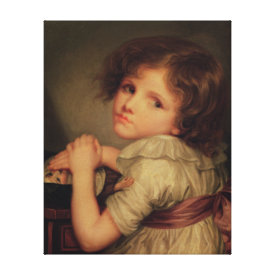An Old Doll
by ADA CAMBRIDGE (1844-1926)
Low on her little stool she sits
To make a nursing lap,
And cares for nothing but the form
Her little arms enwrap.
With hairless skull that gapes apart,
A broken plaster ball,
One chipped glass eye that squints askew,
And ne’er a nose at all—
No raddle left on grimy cheek,
No mouth that one can see—
It scarce discloses, at a glance,
What it was meant to be.
But something in the simple scheme
As it extends below
(It is the “tidy” from my chair
That she is rumpling so)—
A certain folding of the stuff
That winds the thing about
(But still permits the sawdust gore
To trickle down and out)—
The way it curves around her waist,
On little knees outspread—
Implies a body frail and dear,
Whence one infers a head.
She rocks the scarecrow to and fro,
With croonings soft and deep,
A lullaby designed to hush
The bunch of rags to sleep.
I ask what rubbish has she there.
“My dolly,” she replies,
But tone and smile and gesture say,
“My angel from the skies.”
Ineffable the look of love
Cast on the hideous blur
That somehow means a precious face,
Most beautiful, to her.
The deftness and the tenderness
Of her caressing hands . . . . . .
How can she possibly divine
For what the creature stands?
Herself a nurseling, that has seen
The summers and the snows
Of scarce five years of baby life.
And yet she knows—she knows.
Just as a puppy of the pack
Knows unheard huntsman’s call,
And knows it is a running hound
Before it learns to crawl.
Just as she knew, when hardly born,
The breast unseen before,
And knew—how well!—before they touched,
What milk and mouth were for.
So, by some mystic extra-sense
Denied to eyes and ears,
Her spirit communes with its own
Beyond the veil of years.
She hears unechoing footsteps run
On floors she never trod,
Sees lineaments invisible
As is the face of God—
Forms she can recognise and greet,
Though wholly hid from me.
Alas! a treasure that is not,
And that may never be.
The majesty of motherhood
Sits on her baby brow;
Before her little three-legged throne
My grizzled head must bow.
That dingy bundle in her arms
Symbols immortal things—
A heritage, by right divine,
Beyond the claims of kings.

Born in Norfolk, England, Ada Cambridge (aka Ada Cross) migrated to Australia in 1870 a few weeks after marrying the Rev. George Frederick Cross. She became known as Australia’s first notable female poet. Her novels and two autobiographical works are also well known. Many of her novels were serialized in Australian newspapers, and never published in book form. Her first novel Up the Murray appeared inThe Australasian in 1895 but was not published separately. With the 1890 publication of A Marked Man, Ada’s fame was firmly established. In 1913, Ada and her husband returned to England, but after he died in 1917, she returned to Australia. She died in Melbourne on July 19, 1926, survived by two children. A street in the Canberra suburb of Cook is named in her honor. |
Ada Cambridge Contemporaries
Adam Lindsay Gordon
Emily Dickinson
Lewis Carroll
Algernon Swinburne




Recent Comments